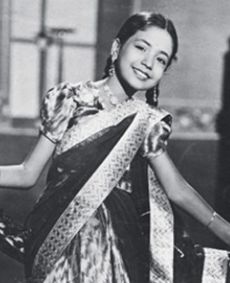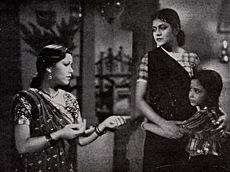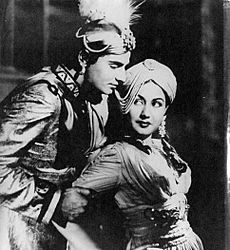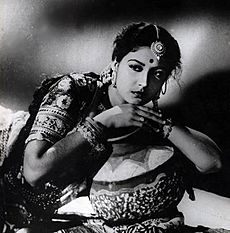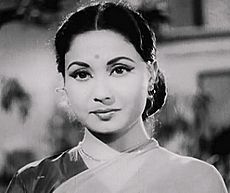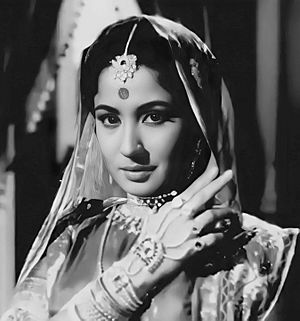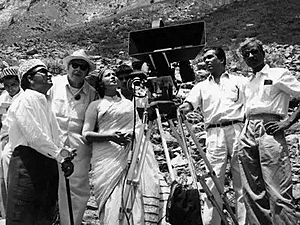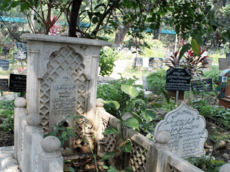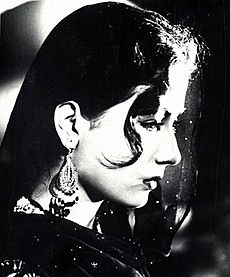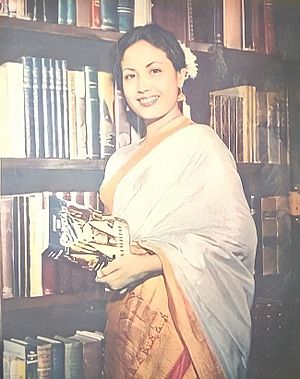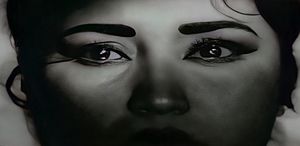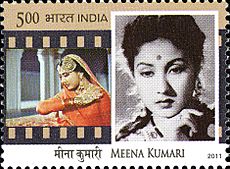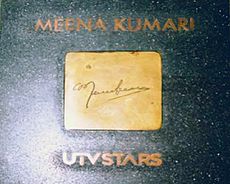Meena Kumari facts for kids
Quick facts for kids
Meena Kumari
|
|
|---|---|
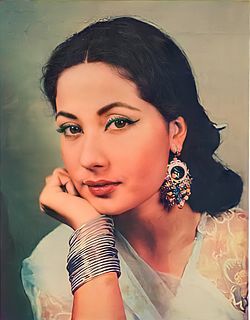
Meena Kumari c. 1957
|
|
| Born |
Mahjabeen Bano
1 August 1933 |
| Died | 31 March 1972 (aged 38) |
| Burial place | Rahmatabad cemetery, Mumbai, Maharashtra, India |
| Nationality | Indian |
| Other names | Tragedy Queen |
| Occupation |
|
| Years active | 1939–1972 |
|
Works
|
Full list |
| Spouse(s) |
Kamal Amrohi
(m. 1952; sep. 1964) |
| Relatives | See Ali-Amrohi family |
| Awards | See List |
| Musical career | |
| Genres |
|
| Associated acts |
|
| Writing career | |
| Pen name | Naaz |
| Signature | |
 |
|
Meena Kumari (born Mahjabeen Bano; 1 August 1933 – 31 March 1972) was a famous Indian actress and poet. She worked in Hindi films. People often called her The Tragedy Queen because she played many sad roles. She was active in movies from 1939 to 1972. Many consider Kumari one of the greatest actresses in Indian cinema. She starred in over 90 films during her 33-year career. She started as a child actress and continued until she passed away at 38.
Meena Kumari won four Filmfare Awards for Best Actress. She won the first-ever Filmfare Best Actress Award in 1954 for her film Baiju Bawra. She won again in 1955 for Parineeta. In 1963, she made history at the 10th Filmfare Awards. She received all three nominations for Best Actress and won for Sahib Bibi Aur Ghulam. Her last Best Actress award was in 1966 for Kaajal. Many critics felt her role in Sahib Bibi Aur Ghulam was much like her own life story.
Contents
Her Early Life and Family
Meena Kumari's father was Master Ali Bux. He was a Sunni Muslim who came from Bhera, which is now in Pakistan. He was a talented artist. He worked in Parsi theatre, played the harmonium, wrote Urdu poetry, and composed music. He also acted in some small film roles.
Meena Kumari's mother was Iqbal Begum. Her first name was Prabhavati Devi. She was Christian but became Muslim when she married Ali Bux. Iqbal Begum was a stage actress before she met Ali Bux.
Her Birth and Childhood
Meena Kumari was born Mahjabeen Bano on August 1, 1933. Her father, Ali Bux, had hoped for a son, so her birth was a disappointment to him. Meena Kumari was the second daughter in her family. She had an older sister named Khursheed Jr. and a younger sister named Mahliqa (also known as Madhu). Her family was very poor. They could not afford to pay the doctor for her birth. Her father even thought about leaving her at an orphanage. However, he changed his mind a few hours later and brought her home.
As a child, Mahjabeen did not want to be in films. She wanted to go to school instead. But her parents needed money. They took her to film studios to find work. Director Vijay Bhatt cast Mahjabeen in his film Leatherface. On her first day, she earned 25 rupees.
Leatherface was released in 1939. Meena Kumari became the main earner for her family at a very young age. She once said in an interview that supporting her parents since she was four years old gave her great satisfaction. She was enrolled in school, but her work often stopped her from attending. She mostly learned through private lessons and by teaching herself.
Her Film Career
Starting as Baby Meena (1939–1945)
Meena Kumari began acting when she was just four years old. She worked a lot with director Vijay Bhatt. Some of her early films were Leather Face (1939), Adhuri Kahani (1939), Pooja (1940), and Ek Hi Bhool (1940). Vijay Bhatt gave her the name "Baby Meena" during the filming of Ek Hi Bhool in 1940.
She acted in more films as Baby Meena. These included Nai Roshni (1941), Bahen (1941), Kasauti (1941), Vijay (1942), Garib (1942), Pratiggya (1943), and Lal Haveli (1944).
Early Adult Roles (1946–1952)
Meena Kumari started using the name Meena Kumari in the film Bachchon Ka Khel (1946). A very sad event in her life was the death of her mother in 1947.
In some early films like Duniya Ek Sarai (1946), Piya Ghar Aaja (1948), and Bichchade Balam (1948), she not only acted but also sang. By the late 1940s, she focused on films about mythology or fantasy. Films like Veer Ghatotkach (1949), Shri Ganesh Mahima (1950), and Aladdin Aur Jadui Chirag (1952) were successful. Her big break came with Vijay Bhatt's musical film, Baiju Bawra (1952).
Becoming a Star (1952–1956)
- 1952: Baiju Bawra – Meena Kumari played the main female role. After this film's success, she became very popular. She modeled for products and appeared on calendars.
- 1953: Parineeta – Directed by Bimal Roy, this film won Kumari her second Filmfare Best Actress Award. It was based on a Bengali novel. She also made a guest appearance in Do Bigha Zamin, which won an international award. Foot Path was her first film with Dilip Kumar.
- 1954: Chandni Chowk – This film was a successful drama directed by B. R. Chopra.
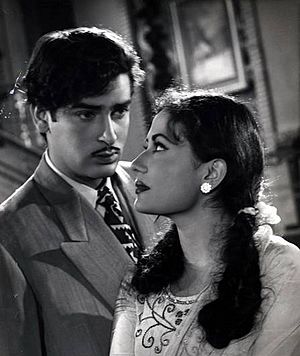
- 1955: Azaad – She starred with Dilip Kumar in this film, which was one of the highest-grossing films that year. It featured the hit song "Aplam Chaplam".
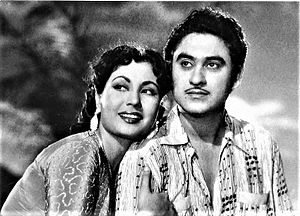
- 1956: Mem Sahib – This film was her first with Shammi Kapoor. Her modern look in the movie was very popular. Ek Hi Raasta was about widow remarriage and was a big success.
The Tragedy Queen (1957–1961)
- 1957: Sharada – This was her first film with Raj Kapoor. She won an award for her acting. It was one of the highest-grossing films of the year.
- 1958: Yahudi – Directed by Bimal Roy, this film with Dilip Kumar was a box office hit. It had the famous song "Yeh Mera Diwanapan Hai".
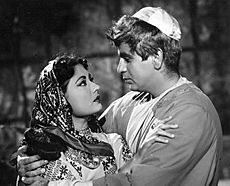
- 1959: Chirag Kahan Roshni Kahan – This film was a huge hit. She also starred in Char Dil Char Rahen and Shararat.
- 1960: Dil Apna Aur Preet Parai – This romantic drama is known for her strong acting. It also featured the hit song "Ajeeb Dastan Hai Yeh".
- 1961: Bhabhi Ki Chudiyan – This family drama was one of the highest-grossing films of the year.
Great Success (1962)
- Sahib Bibi Aur Ghulam
Sahib Bibi Aur Ghulam was a very important film for Meena Kumari. She played the role of Chhoti Bahu. The film won four Filmfare Awards, including Best Actress for her. It was also chosen as India's official entry to the Oscars.
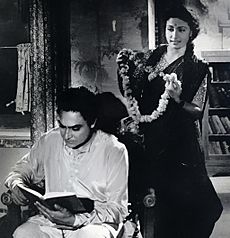
- 1962: Aarti – She won another award for Best Actress for this film.
- 1963: Dil Ek Mandir – This film was a commercial success.
- 1964: Chitralekha – This film was based on a famous Hindi novel.
- 1965: Kaajal – Meena Kumari won her fourth Filmfare award for this film. It was one of the top films of the year.
- 1966: Phool Aur Patthar – This movie was a huge hit and made Dharmendra a big star. Meena Kumari's acting was highly praised.
- 1967: Majhli Didi – This film was India's entry for the Best Foreign Language Film at the Academy Awards.
- 1968: Baharon Ki Manzil – This suspense thriller was one of the major hits of the year.
Later Career and Final Films
By the early 1970s, Meena Kumari started focusing on more 'acting-oriented' or character roles.
- 1970: Jawab and Saat Phere.
- 1971: Mere Apne – This was the first film directed by Gulzar. Dushman was a "super-hit" at the box office.
- 1972: Gomti Ke Kinare – This film was released after her death as a tribute to her.
Completing Pakeezah (1956–1972)
The film Pakeezah was a very long project, starting in 1954. Meena Kumari was determined to finish it. Even though her health was getting worse, she worked hard to complete her performance.
Pakeezah had a big premiere on February 3, 1972. The film was released the next day. It ran successfully for 33 weeks and was a big hit. She received a nomination for her role in Pakeezah after she passed away.
Singing Career
Meena Kumari was also a singer. She sang as a child artist until 1945. As a lead actress, she sang songs in films like Duniya Ek Sarai (1946) and Pinjre Ke Panchhi (1966). She also sang for Pakeezah (1972), but that song was released later in an album.
Her Personal Life
Marriage to Kamal Amrohi (1952)
Meena Kumari met filmmaker Kamal Amrohi in 1938. They met again years later on a film set. Kamal Amrohi offered her a main role in his film Anarkali. In 1951, Meena Kumari had a car accident. She was in the hospital for four months, and Kamal Amrohi visited her often. During this time, they fell in love. The accident left her with an injured left pinky finger. She often covered her left hand with a scarf during filming.
On February 14, 1952, Meena Kumari and Kamal Amrohi secretly got married. Her family did not know about it at first. When the news came out, her father wanted her to divorce. But Meena Kumari decided to stay with her husband.
Health Challenges
In 1968, Meena Kumari was diagnosed with a serious liver condition. She received treatment in London and Switzerland. After getting better, she returned to India in September 1968 and continued working. She was weaker and thinner after her illness. After returning from London, she bought her own home for the first time.
Her Final Days and Passing
Three weeks after Pakeezah was released, Meena Kumari became very ill. On March 28, 1972, she was admitted to a nursing home. She went into a coma two days later and passed away on March 31, 1972. She was 38 years old. The cause of her death was her liver condition.
As her husband wished, she was buried at Rehmatabad Cemetery in Mumbai. Meena Kumari had asked for a special message on her tombstone: "She ended life with a broken fiddle, with a broken song, with a broken heart, but not a single regret." Her husband was buried next to her when he passed away in 1993.
Meena Kumari, the Poet (Naaz)
Meena Kumari was also a talented Urdu poet. She wrote under the pen name Naaz. Her poetry allowed her to express herself and share her thoughts about the film industry.
- I write, I recite – An album of Meena Kumari's poems was released in 1971. She wrote, recited, and sang the poems herself.
- Tanha Chand (Lonely Moon) – This was a collection of her poems. It was put together by Gulzar and published after her death in 1972.
- Meena Kumari, the Poet: A Life Beyond Cinema – Another book of her poems was published in 2014.
Her Lasting Impact
Meena Kumari was known for her natural acting. She would truly cry in her scenes, without needing glycerin. At the peak of her career, she was the highest-paid actress of her time. She was also the first to buy an Impala car.
Film critic Bhawana Somaaya said that top heroes were sometimes hesitant to work with Meena Kumari because her roles were so powerful. She was a mentor to new actors like Dharmendra, helping them start their careers. Legendary Kathak dancer Pandit Lachhu Maharaj praised her dancing skills. He said her movements were very natural and unique.
Meena Kumari also set fashion trends. Women in the 1950s copied her elegant hairstyles and traditional bindis. Her floral and traditional Banarasi silk and Kanjeevaram saris are still popular today.
Meena Kumari's life, with her fame and personal struggles, is often discussed. Every year, on her birthday, many articles and TV shows remember her. Magazines still publish stories about her life and career.
She was especially good at showing the struggles of Indian women in the 1950s and 1960s. Her portrayal of "Sahibjaan" in Pakeezah became a classic.
Awards and Nominations
Filmfare Award for Best Actress
| Year | Film | Role | Result |
|---|---|---|---|
| 1954 | Baiju Bawra | Gauri | Won |
| 1955 | Parineeta | Lalita | Won |
| 1956 | Azaad | Shobha | Nominated |
| 1959 | Sahara | Leela | Nominated |
| 1960 | Chirag Kahan Roshni Kahan | Ratna | Nominated |
| 1963 | Sahib Bibi Aur Ghulam | Chhoti Bahu | Won |
| Aarti | Aarti Gupta | Nominated | |
| Main Chup Rahungi | Gayetri | Nominated | |
| 1964 | Dil Ek Mandir | Sita | Nominated |
| 1966 | Kaajal | Madhvi | Won |
| 1967 | Phool Aur Patthar | Shanti | Nominated |
| 1973 | Pakeezah | Nargis / Sahibjaan | Nominated |
- Records
- In 1963, Meena Kumari made history by getting all three nominations for Best Actress at the Filmfare Awards. No other actress has done this since.
- Her record for the most Filmfare Best Actress awards stood for 13 years.
- Her record for the most nominations (12) was broken after 35 years.
- She is the only actress to be nominated for an award after her death, for Pakeezah.
Bengal Film Journalists' Association Awards
| Year | Film | Role | Category | Result |
|---|---|---|---|---|
| 1958 | Sharada | Sharada Ram Sharan | Best Actress (Hindi) | Won |
| 1963 | Aarti | Aarti Gupta | Won | |
| 1965 | Dil Ek Mandir | Sita | Won | |
| 1973 | Pakeezah | Nargis/ Sahibjaan | Special Award |
Shama-Sushma Film Awards
| Year | Film | Role | Category | Result | Ref(s) |
|---|---|---|---|---|---|
| 1973 | Pakeezah | Nargis/Sahibjaan | Best Actress | Won |
Honors and Tributes
On the day Meena Kumari passed away, her 1952 film Baiju Bawra was re-released. It played to full audiences who were deeply moved.
After her death, actress Nargis wrote an essay titled "Meena – Maut Mubarak Ho" (Congratulations on your death Meena). In 1973, Nargis also started the Meena Kumari Memorial for the Blind in her memory.
- In 1979, a film called Meena Kumari Ki Amar Kahaani (The immortal story of Meena Kumari) was released. It was dedicated to her.
- A short documentary about her, Shaira (Poetess), was released the next year.
- A postal stamp was issued in her honor in 2011 by India Post.
In 2010, Filmfare magazine listed her performances in Sahib Bibi Aur Ghulam and Pakeezah among Bollywood's "80 Iconic Performances." Her films Baiju Bawra and Do Bigha Zameen are considered among the greatest Indian films.
In 2012, her autograph was featured at the Walk of the Stars in Mumbai. This area honored film artists from the Hindi film industry.
In May 2018, a play about her life, Ajeeb Dastaan Hai Yeh, was performed in Jaipur.
On August 1, 2018, Google honored Meena Kumari with a Doodle on her 85th birthday. Google noted that she "captivated audiences with her beautiful, expressive eyes."
Biographies and Films About Her
- One of the first books about Meena Kumari was written by Vinod Mehta in 1972. It was called Meena Kumari: The Classic Biography.
- Another book, Simply Scandalous, was published in 1998.
- Aakhri Adhai Din was a Hindi book about her, published in 2006.
Filmmakers today are still interested in Meena Kumari's life story.
- In 2015, there were plans to make a film about her based on Vinod Mehta's book. However, this film was not made due to various reasons.
- In 2017, director Karan Razdan wanted to make a movie about her. Several actresses were considered for the role.
- In 2018, a web series about her life was announced.
- In 2019, Sanjay Leela Bhansali announced a remake of her classic film Baiju Bawra.
- In 2020, another web series about her life was announced.
- In 2022, a web series about her love story with Kamal Amrohi and the making of Pakeezah was announced.
- Also in 2022, there were reports that actress Kriti Sanon might play Meena Kumari in a new biopic.
See also
 In Spanish: Meena Kumari para niños
In Spanish: Meena Kumari para niños
 | Claudette Colvin |
 | Myrlie Evers-Williams |
 | Alberta Odell Jones |


